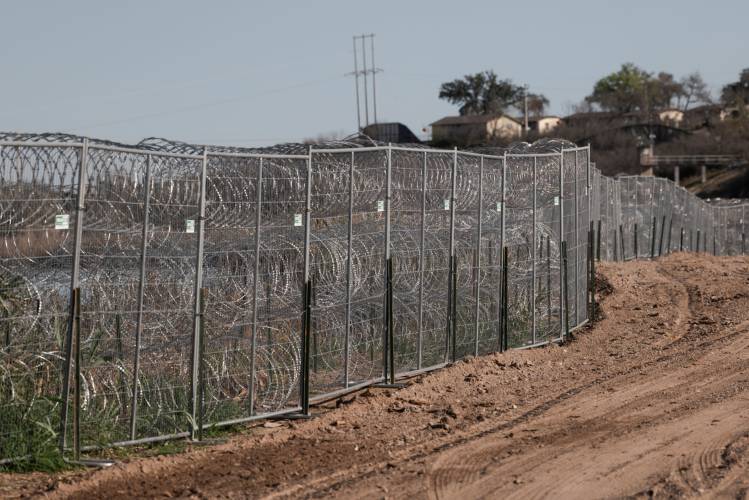Opinion: Immigration from a different perspective

Fences lined with concertina wire along the banks of the Rio Grande River in Shelby Park in Eagle Pass, Texas on Friday, Feb. 23. Jordan Vonderhaar / Bloomberg
| Published: 03-01-2024 6:00 AM |
Allan MacDonald is a retired public school teacher and small businessman from New London.
The Apollo 8 astronauts were the first humans to see Earth-rise from a lunar orbit. Viewing this blue ball rising above the desolate lunar surface, astronauts saw the earth’s fragility in the blackness of space, and felt an increased sense of connection to humanity and to the earth. Author Frank White called this cognitive shift the Overview Effect.
Throughout history, humans have consistently created boundaries between themselves and the Other: divisions between countries, religions, political parties, skin colors, classes, genders, etc. But seen from space, these boundaries are invisible and lose their significance. There’s only humankind on a lonely planet.
In recent years, we have faced three issues that begged to be seen through the Overview lens: nuclear war, pandemic, and climate change. These are profound threats to humankind and our earthly home.
Let’s add another: Human migration. Worldwide today, tens of millions of people are on the move (UNHCR). They seek to escape civil wars, the effects of climate change, persecution, violence, dysfunctional governments, gangs, human trafficking, kidnappings, and oppression. They’re willing to undertake dangerous journeys to bring their families to safety.
The Overview Effect asks us to consider our common humanity. Facing similar challenges, wouldn’t we do the same for our loved ones?
The Overview Effect can also be applied to one of the unfortunate factors complicating the immigration debate: racism. In “The History of White People,” Nell Irvin Painter makes such a case.
Based on advances in molecular genetics and studies of the human genome, the American Association for the Advancement of Science (in 1995) and the American Association of Physical Anthropologists (in 1997) both asserted that “in biological terms, race holds no scientific validity.” Painter writes: “Each person shares 99.99% of the genetic material of every human being . . . And in the genetic sense, all people are African descended.” That is, the only “race” is the human race.
Article continues after...
Yesterday's Most Read Articles
Skin color? It’s the product of two kinds of melanin in the skin, the interplay of genes, and UV radiation from the sun. Over millennia, climate has produced variations in skin color: lighter skin in the north and darker skin on the equator, where melanin protects the skin from harmful UV radiation. The mixing of genes over generations and the movement of populations over time have created a continuous spectrum of skin colors.
All this said, there’s no denying that human migration is a conundrum for all humankind. The influx at our southern border has been destabilizing and anxiety-provoking.
A start would certainly be overhauling our asylum system, something that hasn’t been done comprehensively since 1986 (Immigration Reform and Control Act, signed by Ronald Reagan). This would be the job of the U.S. Congress, but they have preferred to cynically exploit immigration as an election issue rather than getting the job done.
It would help to acknowledge that we have a severe worker shortage in our country. Immigrant workers would boost businesses, pay taxes to relieve the national deficit, and contribute to our struggling Social Security and Medicare systems.
It would also help to acknowledge that the U.S. had a heavy hand in creating the instability in Central America that has contributed to the migrant surge. (Read “Everyone Who Is Gone Is Here: The United States, Central America, and the Making of a Crisis” by Jonathan Blitzer.)
Would a well-designed and managed immigration system finally allow a self-described Christian nation to honor the Biblical call to love our neighbor and welcome the stranger?
I often wonder how Mary, Joseph, and baby Jesus would be treated at our southern border today as they flee the terror of Herod. Some Americans, informed by a toxic and dehumanizing rhetoric, would send these “vermin” back to Herod before they “poisoned the blood of our country.” Why not see them as part of a vast and challenging human migration of desperate people seeking to escape hopelessness?
We must decide what values this country holds dear and demand that the U.S. Congress design an asylum policy that is both realistic and humane, ASAP.







 Opinion: Trumpism in a dying democracy
Opinion: Trumpism in a dying democracy Opinion: What Coolidge’s century-old decision can teach us today
Opinion: What Coolidge’s century-old decision can teach us today Opinion: The art of diplomacy
Opinion: The art of diplomacy Opinion: After Roe: Three years of resistance, care and community
Opinion: After Roe: Three years of resistance, care and community
